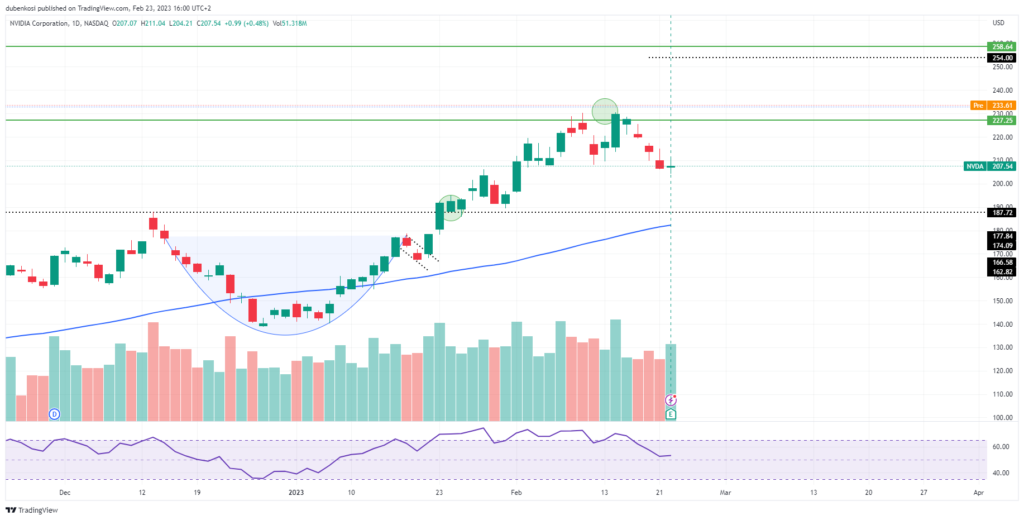NVIDIA Corporation’s (NASDAQ: NVDA) share price is up a mouth-watering 42% on the back of optimism over a prominent deal between Microsoft and Nvidia, which will see Nvidia’s platform used for Microsoft’s growing gaming division. Fuelling the bullish drive was the earnings and revenues results for Q4 which beat consensus by 8.53% and 0.60%, respectively.
Despite experiencing a gloomy 2022, with revenues slightly chipped and the bottom line eaten away, the semiconductor industry is set to grow into a trillion-dollar industry by 2030, according to Deloitte. Nvidia is in an excellent position to take advantage of industry growth, considering it is an alpha in the U.S. and the second-largest semiconductor business by market capitalisation.

Source: Koyfin
NVDA’s superior year-to-date performance (return) is highlighted in the graphic above. Compared with the S&P 500 (SPX), the tech-heavy Nasdaq 100 (NDX) and one of the largest tech ETFs, Vanguard Information Technology ETF (VGT), NVDA has outperformed them by a large margin.
Driving strong performance is the recent success of Artificial Intelligence (AI) inference applications, such as ChatGPT. Nvidia’s investors firmly believe that the business is in a pole position to take advantage of the future growing demand for AI services, which will see the top line head north. Nvidia’s AI-powered data centre business has seen a surge in revenue from $968 million in the last quarter of 2019 to $3.62B in the latest quarter, further supporting the growth trajectory of the AI services industry.
Technical
Full of enthusiasm, bulls were buying into NVDA from the onset of 2023 and completed a cup and handle formation in the process. Price was subsequently driven to a resistance level of $227.25 per share, while support formed following a breakout above the prior high at the $187.72 per share.
Price currently trades at resistance in premarket hours. A breakout above the $227.25 level on high volumes could validate another bullish drive in the market to fit in with a positive outlook of the semiconductor industry and NVDA’s guidance.
If bearish investors take the weaker year-on-year performance to heart, price will likely be dragged down toward the support at the $187.72 per share level.

Fundamental
Weighing down on NVDA’s top-line was a decline in demand for Personal Computing during the last quarter of 2022. According to Gartner, a 28.5% dip in PC shipments posted the most significant quarterly decline since tracking of the PC market began in the 1990s. When it rains, it pours. Subsequently, the Q4 gaming business revenue plunged 53% year-on-year, and despite growing 16% from the prior quarter, it remains far off the peak.
Operating income and net income were down 29% and 26%, respectively, on a Non-GAAP basis. This signals the weakness in the market; however, it is not all doom and gloom. The Data center division contributing 56% of revenue surged 41% to $15B for 2023’s fiscal year. The advancement in self-driving solutions also saw the automotive division more than double its revenues for the year, beating consensus, with growth unlikely to end soon.
NVDA’s guidance for 2024’s first quarter is positive and above historical, with $6.50B forecasted. The forecasts are aligned with growth in AI services which have seen a surge in demand in recent years. If NVDA can keep up with industry standards and consumer demand, the share price will likely experience some tailwinds.
After discounting for future cash flows, a fair value of $254 per share was derived. Price currently trades at a 9.59% discount to fair value in premarket hours, leaving significant room for upside.
Summary
The main question is: Will the rise of AI be similar to that of the Dot-com Bubble? If it is anything near the extent of the Dot-com Bubble, NVDA’s share price is likely to move north. The breakout of the $227.25 level could be the beginning of a bullish marathon.
Sources: Nvidia Corporation, Deloitte, Forbes, Reuters, Financial Times, CNBC, TradingView, Koyfin

